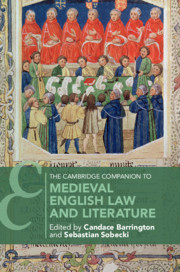Book contents
- The Cambridge Companion to Medieval English Law and Literature
- The Cambridge Companion to Medieval English Law and Literature
- Copyright page
- Contents
- Illustrations
- Contributors
- Abbreviations
- Preface
- Part I Legal Contexts
- Part II Literary Texts
- 7 Treason
- 8 Complaint Literature
- 9 Political Literature and Political Law
- 10 William Langland
- 11 Geoffrey Chaucer
- 12 John Gower
- 13 Lollards and Religious Writings
- 14 Lancastrian Literature
- 15 Middle English Romance and Malory’s Morte Darthur
- 16 Marriage and the Legal Culture of Witnessing
- Index
- References
16 - Marriage and the Legal Culture of Witnessing
from Part II - Literary Texts
Published online by Cambridge University Press: 26 July 2019
- The Cambridge Companion to Medieval English Law and Literature
- The Cambridge Companion to Medieval English Law and Literature
- Copyright page
- Contents
- Illustrations
- Contributors
- Abbreviations
- Preface
- Part I Legal Contexts
- Part II Literary Texts
- 7 Treason
- 8 Complaint Literature
- 9 Political Literature and Political Law
- 10 William Langland
- 11 Geoffrey Chaucer
- 12 John Gower
- 13 Lollards and Religious Writings
- 14 Lancastrian Literature
- 15 Middle English Romance and Malory’s Morte Darthur
- 16 Marriage and the Legal Culture of Witnessing
- Index
- References
Summary
To understand the origins of the legal culture of witnessing, we will begin with institutional church history, specifically the Fourth Lateran Council of 1215. Better known in recent scholarship as a watershed in the history of confession, the Fourth Lateran Council catalysed a major shift in legal practice by promoting the witness trial and effectively outlawing the ordeal and trial by battle. In its aftermath, witness depositions became, in practice, the most common form of proof in late medieval English church courts. In contrast to the ordeal and trial by battle which relied on direct divine intervention to determine the outcome, the trial gave new power to ordinary people to act as witnesses in court. This emphasis on testimony in both ecclesiatical and secular courts led to the wide participation of the community in legal culture as victims, neighbours and jurors, ensuring that legal concepts of evidence were not, in Lorna Hutson’s words, ‘esoteric professional doctrine’, but widely diffused through society.
- Type
- Chapter
- Information
- The Cambridge Companion to Medieval English Law and Literature , pp. 202 - 212Publisher: Cambridge University PressPrint publication year: 2019



